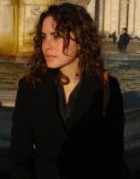This interview is over 1 year old and may no longer be up to date or reflect the interviewee/interviewees’ positions
Naomi House’s interview with success story Lia.
 Naomi: How did you find your current job?
Naomi: How did you find your current job?
Lia: Right out of library school I found a part-time job working for my organization’s online publishing initiative. A few months later, we began talking about redesigning the website. I had taken user interface design and introductory web development courses in library school, and at the time was enrolled in a web development certificate program at NYU and was also studying on my own on codeacademy.com. So when my boss asked how we should go about the redesign, I jumped on the opportunity. I told him I had experience in this area and that I wanted to be significantly involved in the project. The result was a full-time job.
Naomi: Favorite library you have been to?
Lia: The University of Chicago’s Harper Library.
Naomi: Favorite book?
Lia: The Blind Assassin by Margaret Atwood. Maus by Art Spiegelman. On Looking by Lia Purpura. Ann Patchett’s Truth & Beauty. Other eye-opening reads: Thinking, Fast and Slow by Daniel Kahneman, The Drunkard’s Walk by Leonard Mlodinow, How We Decide by Jonah Lehrer.
Naomi: Favorite thing about libraries/ library technology?
Lia: That they are an endless source of inspiration for learning and creativity. That they make one feel wealthy.
Naomi: Any websites or feeds or blogs we should be following?
Lia: Ted talks are like steroids for the mind (http://www.ted.com/talks). I highly, highly recommend picking up a skill or two on codeacademy.com. If you want a more structured online path to becoming a web developer or designer check out treehouse (http://teamtreehouse.com/).
Naomi: Best piece of job hunting advice?
Lia: Don’t follow your dreams — follow your flow. A lot of confusion and stress can be created around the idea of following your dreams. Researchers have found that one of the greatest determinants of happiness is how much and how often you are in a state of “flow” — quite simply, how little you are noticing time go by. Instead of trying to figure out whether a job aligns with your idea of what a dream job should be, try to determine if it will be so engrossing that you won’t notice the time go by. Joy, success, contentment, and confidence all follow with being deeply involved in something on an hour-by-hour, minute-by-minute basis. For me this means problem solving and creating.
Be an insatiable, almost indiscriminate consumer and distributor of information. I know information overload is a real problem, so try to be strategic in your consumption. But with that said, consume anything and everything. Information really is power. Listen to podcasts, read traditional press, as well as self-published books and e-books, blogs, magazines, and online articles. Read about history, entrepreneurship, politics, technology, career development, psychology, economics, philosophy. Consume fiction. Listen to podcasts. Watch TV shows and movies. You never know what piece of information is going to come in handy in work or in life, and a wide breadth of knowledge will serve you immensely. Essentially, you should be a lifelong, tireless learner — something I think librarian types are already good at. Also know that the thing you feel like reading is the thing you need to be reading — never feel like you should be reading one type of thing or another.
You really should have a high quality personal website that comes up easily in search results and have as much of a web presence as you can manage. To the best of your ability, try to obtain technical skills – they really do give you an edge in the applicant pool and in the workplace. Don’t underestimate the value employers will place on knowing or having a presence in the digital space. Use your librarian super powers to think strategically and to dig up niche job listings and appeal to markets that may not be getting looked at by people.
Finally, consider a job in the web space, for example, as a web developer, user interface designer, information architect, or as a database administrator. It’s an exciting time to be involved, and it really does feel like this is where the future lives. As librarians and information professionals, we are uniquely positioned to bring a lot of value to this arena, to understand both the technical and the human elements, and to be able to bridge the gap between people and information. Take advantage of it.
Lia Skalkos is a web developer and project manager at the New York Genome Center. She holds an MLIS from Rutgers, a BA in English from the University of Chicago, and a certificate in Web Development from NYU. In her spare time she likes to code, admire cats and other animals, read, watch shows, write, and explore Hoboken & NYC. She is passionate about good user interface design and creating and problem-solving through code. She plans on making some new sites and updating her own to showcase her new skills soon.
All Jobs for INALJ can be found here: http://inalj.com/?p=1441 Updated daily